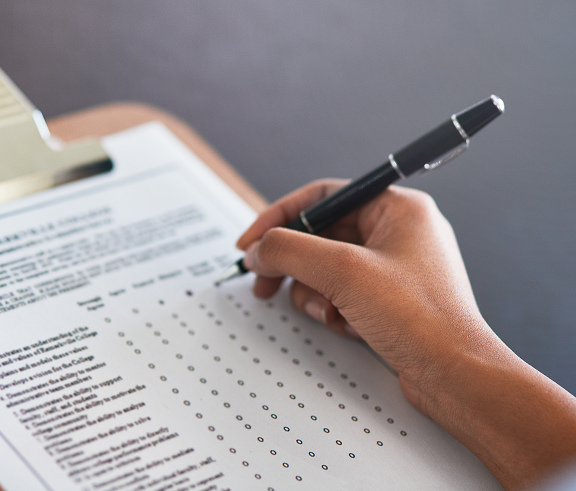A pre event planning questionnaire is a document used to collect information from individuals or organizations planning an event. The questionnaire can be used to collect data on the event's purpose, the desired outcomes, and the potential attendees.
It also helps gather information on the resources needed to execute the event successfully. Here in this article, we'll cover the need and use of a pre event planning questionnaire, an event photography questionnaire, and how Oreed can help successful event designs.
Types of Event Questionnaire
There are all sorts of event questionnaires out there. And, often, it can be hard to know which one is right for you. To help you make a decision, here is a quick rundown of some of the most popular event questionnaires:
1. The pre-event questionnaire:
This type of questionnaire is typically sent out a few weeks before the event. It helps to gather information about attendees’ expectations and dietary preferences.
2. The post-event questionnaire:
This type of questionnaire is typically sent out after the event. It helps to gather feedback about the event itself and get ideas for ways to improve future events.
3. The satisfaction survey:
This type of questionnaire is typically sent out after the event. It helps to gauge attendees’ level of satisfaction with the event and identify areas that need improvement.
4. The exit survey:
This type of questionnaire is typically given to attendees as they leave the event. It helps gather last-minute feedback about the event and get an idea of what people thought about it.
No matter what type of event questionnaire you choose, make sure that it is tailored to your specific needs and goals. Doing so will ensure you get the information you need to make your next event even better than the last.
What is a pre event planning questionnaire, and its purpose?
A pre-event planning questionnaire is a short survey that event planners can use to gather information from potential attendees. The questionnaire can be used to gauge interest in an upcoming event and collect contact information and preferences.
Additionally, the questionnaire can identify potential issues that could arise during the event. By completing a pre-event planning questionnaire, event planners can ensure that their events are well-organized and run smoothly.
Types of Pre Event Questionnaires
Planners use pre-event planning strategies to think through all the possible scenarios that could occur during an event. By doing this, they can be prepared for anything that might happen. There are three main types of pre-event planning: Objective setting, risk assessment, and contingency planning.
Objective setting:
The objective setting involves clearly defining what the event is trying to achieve. Planners need to ask themselves what the purpose of the event is and what goals need to be met in order for it to be considered a success.
Risk assessment:
Risk assessment is all about identifying potential risks and hazards that could occur during the event. Once these risks have been identified, contingency plans can be put in place to mitigate them.
Contingency planning:
Contingency planning is having a plan B (and sometimes even a plan C) in case something goes wrong. By thinking through all the potential problems that could occur, planners can be prepared for anything that might happen on the event day.
Questions to Include In A Pre Event Planning Questionnaire?
When planners are preparing for an event, they need to account for a variety of details to ensure that everything comes together smoothly on the big day. To help them do this, it is helpful to put together a pre-event planning questionnaire. This document can serve as a roadmap for the event, helping to ensure that all of the necessary details are accounted for.
Some questions that could be included in a pre event planning questionnaire include:
- What is the purpose of the event?
- Who is the target audience for the event?
- What are the desired outcomes of the event?
- What is the budget for the event?
- What resources are needed to execute the event successfully?
- Who will be responsible for each aspect of the event?
- What is the timeline for planning and executing the event?
- What are the potential risks associated with hosting the event?
- How will these risks be mitigated?
- Are there any special requests that attendees have regarding photography coverage at events? For example, do any attendees require photo release forms?
- What is the desired atmosphere of the event?
- What is the color scheme for the event?
- What is the overall aesthetic of the event?
- Who is responsible for designing the event space?
- What are the dimensions of the event space?
- What furniture and décor will be needed for the event?
- Are there any special requests regarding the appearance of the event?
- How will the event space be laid out?
- What is the expected number of attendees?
- What is the maximum capacity of the event space?
- Is there a theme for the event?
- How can attendees be made aware of the theme?
- Are there any restrictions on what can be done regarding event design?
- Is there a preferred location for the event?
- Are there any special requirements or requests that attendees have?
By including all of these questions in a pre-event planning questionnaire, event planners can be sure that they have considered all of the important details before moving forward. This helps to ensure that the event goes off without a hitch and meets all of its goals and objectives..
The Benefits Of A Pre-Event Questionnaire
A pre-event questionnaire can help ensure that all necessary information is collected before an event. A pre-event questionnaire can help identify potential risks or issues during the event.
By identifying these risks ahead of time, it is possible to take steps to mitigate them. Additionally, a pre-event questionnaire can help determine the resources needed to execute the event successfully.
Tips for Creating Your Own Questionnaire
When creating your own questionnaire, keep these tips in mind.
- Make sure the questions are straightforward and easy to understand
- Keep the questions brief so that respondents will not lose interest.
- Use closed-ended questions whenever possible so that respondents will have less difficulty answering them.
- Include demographic questions so that you can segment the data later on.
Event Photography Questionnaire
Before your event, it's always a good idea to have a photography questionnaire on hand. This way, you can get an idea of what type of photos your guests would like to have taken. Here are some questions to include on your questionnaire:
- -What is the occasion?
- -Who will be attending the event?
- -What type of photos do you want? (portraits, candid, group, etc.)
- -Where will the event be held?
- -What time of day will the event take place?
- -Will there be any special activities or performances?
- -Are there any specific people or moments you would like captured in photos?
By asking these questions in advance, you'll be able to better prepare for your event and ensure that you capture the types of photos your guests will love.
Circulation and Distribution of the Event Questionnaire
A crucial part of event organization is ensuring that the right people receive the event questionnaire.
- The first step is to identify the target audience for the event. This may include employees, customers, vendors, or other individuals with a stake in the event.
- Once the target audience has been identified, the next step is to develop a distribution plan. The most efficient way to distribute the questionnaire may be via email, but other options include mail or hand delivery.
- Once the questionnaire has been distributed, it is important to follow up with recipients to ensure that they have received it and that they understand how to complete it.
By taking these steps, organizers can ensure that the questionnaire reaches its intended audience and that feedback can be used to improve the event.
7 Characteristics Of A Successful Event Planner
There are a few key characteristics that all successful event planners share.
First, they are excellent communicators. They know how to communicate with their clients to meet their needs. Additionally, they are highly organized and can juggle multiple tasks at once. They also have a keen eye for detail and are always thinking ahead. More and more, they can think outside the box and come up with creative solutions to problems.
Some other characteristics of successful event planners include but are not limited to:
- Being able to work under pressure
- Being flexible and adaptable
- Having strong negotiation skills
- Being resourceful
- Having a positive attitude
The 6 Best Online Event Management Tools
There are a variety of event management tools available. Some of the most popular tools include:
Oreed:
Oreed is an online platform that helps event planners manage their events. Oreed offers a variety of features, including:
- Drag-and-drop interface that makes it easy to create an event website.
- Ticketing system that allows event planners to sell tickets and track attendance.
- Scheduling tool that helps event planners create and manage their event schedules.
- Payment system enables event planners to accept payments and track finances.
Oreed is a comprehensive event management platform that can help event planners with all aspects of their events.
Eventbrite:
Eventbrite is a tool that helps event planners create and manage their events. Additionally, Eventbrite provides a ticketing system and analytics to help event planners track their event's success.
Whova:
Whova is an event management platform that provides various tools to help event planners plan successful events.
Vfair:
Vfair is an event management platform that helps event planners with all aspects of their events. Vfair offers a variety of features, including a ticketing system, a scheduling tool, and a payments system. Vfair is a comprehensive event management platform that can help event planners with all aspects of their events.
Cvent:
Cvent is another event management platform that provides event planners with tools. Cvent also offers a mobile app so attendees can stay up-to-date on the latest event information.
Social Tables:
Social Tables is a tool that helps event planners create floor plans and seating charts. Additionally, Social Tables provides a check-in system so event planners can track attendees.
How Can Oreed Help In Planning A Successful Event?
Planning a successful event takes a lot of work, and there are a lot of moving parts to keep track of. This is where Oreed can help. Oreed is an online event planning software that can help you keep track of all the details of your event, from start to finish.
With Oreed, you can create a detailed event schedule, track RSVPs and guest lists, manage registrations, and more. O
reed can also help you stay organized by creating to-do lists and reminders for yourself and your team. When it comes to event planning, Oreed is a powerful tool that can help you get the job done right.
Conclusion
Event planning is a complex process. However, by following these tips and using the right tools, event planners can set themselves up for success. Oreed is one of the many event management platforms that can help event planners plan successful events. Using Oreed, event planners can connect, share resources, and use various event management tools.
FAQs:
What Are The 5 C's Of Event Designing?
The five C's of event design are:
- Creativity: Creativity is essential in event design to develop unique and innovative ideas.
- Collaboration: Collaboration is necessary to bring all of the different elements of the event together.
- Communication: Communication is key to ensuring that everyone involved in the event is on the same page.
- Coordination: Coordination is necessary to ensure that the event runs smoothly.
- Cost: Cost is a factor that must be considered when designing an event.
What are the stages of event planning?
Any good event planner knows that successful event planning requires careful coordination and attention to detail. There are four main stages of event planning: developing the concept, planning the logistics, executing the event, and conducting a post-event analysis.






